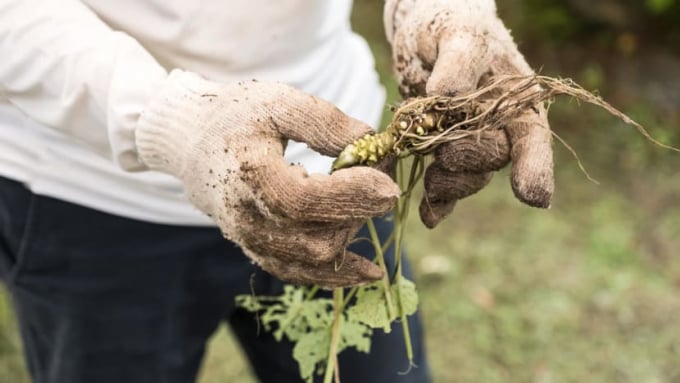May 17, 2025 | 18:22 GMT +7
May 17, 2025 | 18:22 GMT +7
Hotline: 0913.378.918
May 17, 2025 | 18:22 GMT +7
Hotline: 0913.378.918

A farmer holds a freshly harvested wasabi plant at a rural farm in Nara, Japan. Photo: iStock
"Recently the power of typhoons feels totally different from before due to global warming. It's getting stronger," said the 70-year-old farmer in Okutama, west of downtown Tokyo.
"Since it's happened once, there's no guarantee it won't happen again."
Wasabi, the tangy Japanese horseradish that's an essential part of sushi and dabbed onto slices of raw fish or into bowls of soba buckwheat noodle soup, is usually grown along streams in narrow valleys, leaving farms prone to disasters.
Typhoon Hagibis, which slammed into eastern Japan in 2019, slashed production in Okutama by nearly 70 per cent the next year. The need for replanting and careful tending meant it's taken nearly three years for sushi farms there to recover.
Experts say global warming is affecting production not only by increasing the number and severity of storms, but with rising temperatures that threaten growth of the plants, which need to be in water with a consistent temperature between 10 and 15 degrees Celsius year-round.
A lack of wasabi could also endanger traditional Japanese foods such as sushi and sashimi, where the tang of the wasabi is used as a contrast with raw fish.
Weather is not the only obstacle wasabi farmers face. A drop in rural populations due to aging means there are no successors. Because of the two factors, the output of wasabi grown in clear-flowing water, like at Hoshina's farm, had fallen to half that of 2005, according to the Agriculture Ministry.
Norihito Onishi, head sales manager at a chain of soba buckwheat noodle restaurants called Sojibo, has seen his business directly affected by wasabi shortages and supply problems.
The restaurants were long known for allowing customers to grind their own wasabi roots to produce the spicy paste used as a condiment for soba. But they've had to mostly give this up.
"In the past, we served all the cold soba noodles with a piece of raw wasabi, but now we can no longer do that," Onishi said.
Though wasabi root was plentiful when the restaurant first opened 30 years ago, Onishi said over the last five to 10 years there have been times when he couldn't get any at all. The precious root is now made available only for certain types of dishes.
"If this unstable supply of wasabi persists, due to many factors including global warming, we will face a situation where we need to come up with other ways to overcome the problem so we don’t end up not serving raw wasabi at all," said Onishi.
(CNA)

(VAN) Fourth most important food crop in peril as Latin America and Caribbean suffer from slow-onset climate disaster.

(VAN) Shifting market dynamics and the noise around new legislation has propelled Trouw Nutrition’s research around early life nutrition in poultry. Today, it continues to be a key area of research.

(VAN) India is concerned about its food security and the livelihoods of its farmers if more US food imports are allowed.

(VAN) FAO's Director-General emphasises the need to work together to transform agrifood systems.

(VAN) Europe is facing its worst outbreak of foot-and-mouth since the start of the century.

(VAN) The central authorities, in early April, released a 10-year plan for rural vitalization.

(VAN) Viterra marked a significant milestone in its carbon measurement program in Argentina, called Ígaris, reaching 1 million soybean hectares measured.